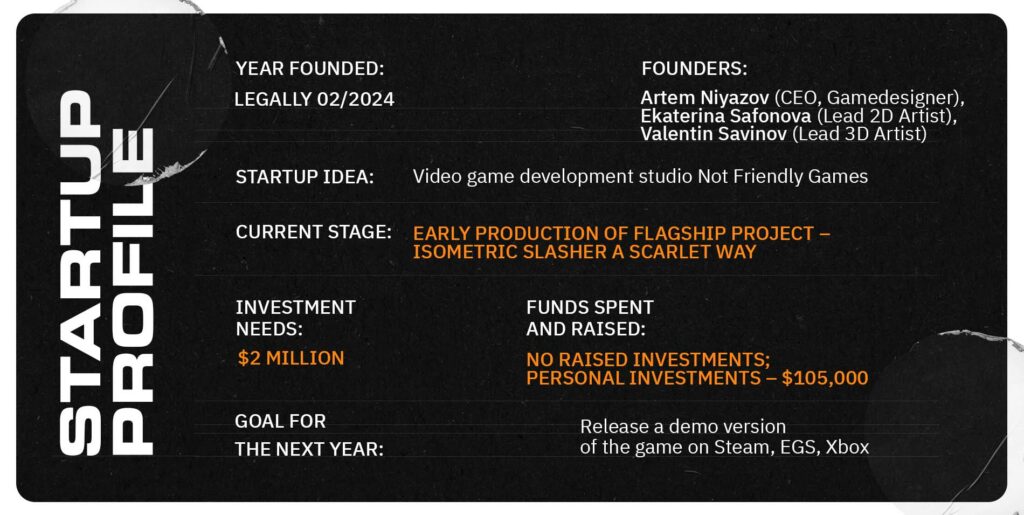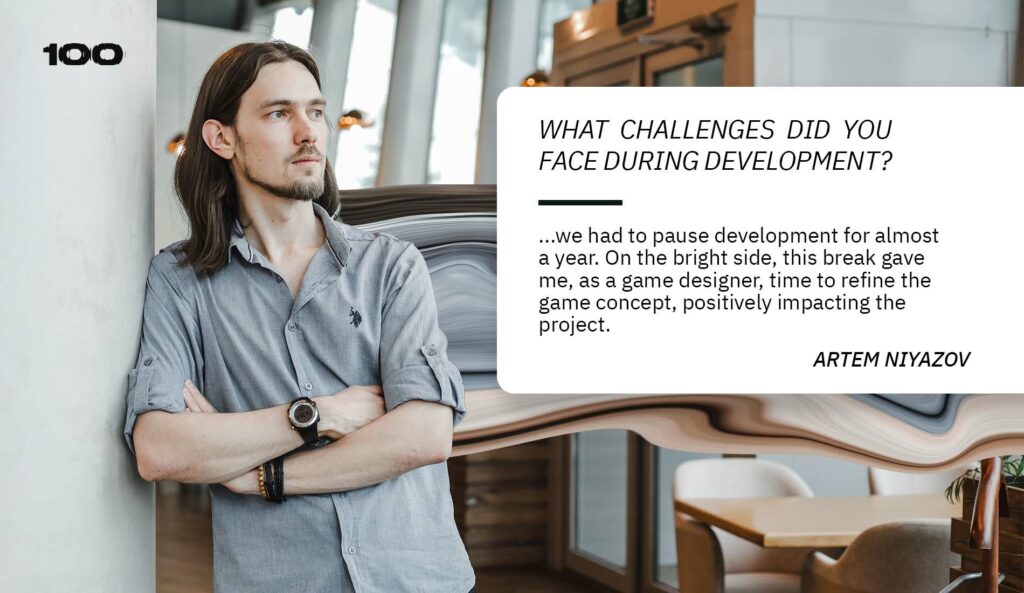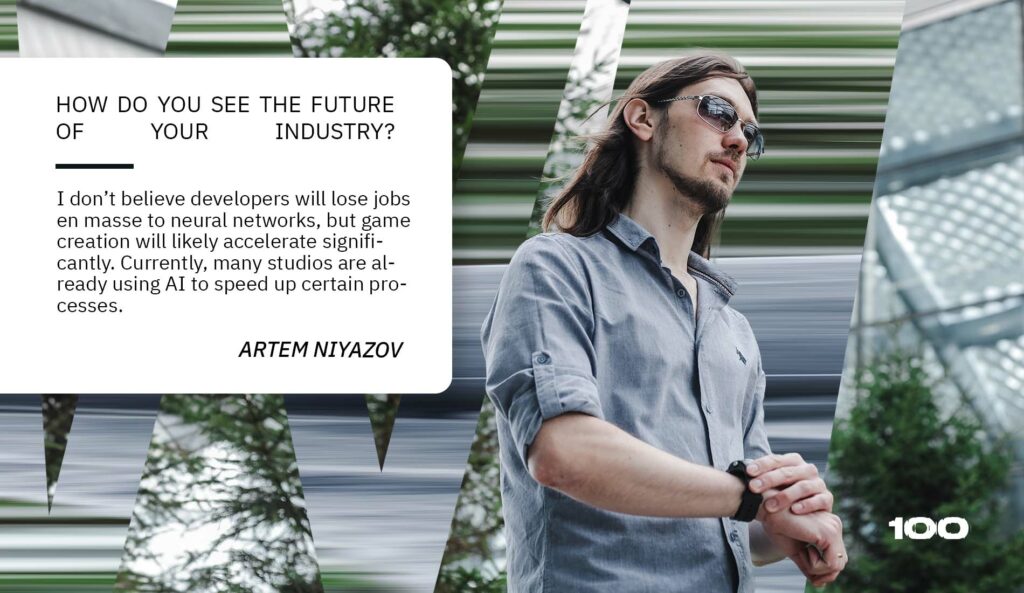The global gaming industry is one of the most massive and rapidly evolving sectors today. Currently valued at $300 billion, the market boasts 3.2 billion gamers worldwide. In developed countries, 60-70% of the population engages in gaming on PCs or smartphones. Despite the immense popularity of video games, Kazakhstani developers have a minimal presence in this promising market, with no high-quality products winning over tens of thousands of gamers. However, the Kazakhstani startup Not Friendly Games, a participant in Astana Hub, is set to change the scene and become the first Kazakhstani studio to achieve international success.
Er10.media had an enlightening conversation with Artem Niyazov, the founder of Not Friendly Games, about their journey, game creation, and ambitions for the global market.
Follow Kazakhstan’s Startup Movement in the "100 Startup Stories of Kazakhstan", a collaborative project by ER10 Media and Astana Hub. This initiative highlights the most innovative Kazakh startups, showcasing projects that stand out for their creativity and impact. Among the heroes are Astana Hub residents, as well as creators of other innovative technological products and services. The content is available in Kazakh, Russian and English.

– How did Not Friendly Games begin? What sparked the idea?
Niyazov: It’s a pretty interesting story. I’ve been passionate about board and computer games for a long time. Initially, GameDev seemed like an exclusive realm for a select few. But as I immersed myself in it, I realized that becoming a developer was entirely achievable. In December 2020, I woke up with a clear vision that it was time for a change and decided to pursue game design seriously. As I honed my skills, I landed a job at Playrix, a Russian gaming company. After three years there, the urge to create my own project became irresistible.
During my game design studies, I met like-minded individuals, and together we began working on various projects, participating in events, and even releasing one of our creations. This collaboration gradually evolved into a small professional team, understanding both the creative and business aspects of GameDev. In February 2024, we officially launched our studio. Today, our team comprises 15 specialists, with the core team being myself, Ekaterina Safonova, and Valentin Savinov.

– What is the focus of Not Friendly Games?
Niyazov: Our primary goal is to develop video games for PCs and consoles. We aim to create captivating and original projects that gamers will love. Unlike many companies that produce games solely for profit, often leading to player dissatisfaction and financial losses, we focus on creating games with a “soul.” We believe that engaging games will naturally lead to commercial success.
We want to elevate Kazakhstani GameDev to be noticeable and in demand on the global stage. Currently, there are very few high-quality gaming projects from Kazakhstani developers. Our team is determined to show that small, independent studios can create strong, impactful projects without merely chasing hype.
– What genres are you focusing on?
Niyazov: Currently, we're focused on action games in the slasher genre. The most notable representatives of this genre are the Devil May Cry, Bayonetta, and Darksiders series, which have millions of loyal fans worldwide. We're developing our first game in a future trilogy: Untold Tales: A Scarlet Way.
– How does your game stand out from competitors?
Niyazov: Competing with giants like Devil May Cry and Bayonetta with our resources is almost impossible. We aim to surpass mid-tier games like Soulstice and Darksiders Genesis. Genesis, the fourth part of the series, was an isometric slasher experiment, but it failed to attract a mass audience due to its weak and monotonous execution. Soulstice followed more classic slasher footsteps but had poor execution, leading to unengaging combat dynamics and uninspired enemies and locations.
Soulstice followed the path of more traditional slashers, but its execution left much to be desired. The combat dynamics were quite lackluster, with enemies and locations being monotonous and dull. The combat system lacked variety, and the controls were inconvenient.
We aim to create a game in a similar style but much more engaging and dynamic. Our first game, Untold Tales: A Scarlet Way, reimagines Red Riding Hood in an alternate version. The game is being developed in a dark fantasy setting with elements of Victorian architecture. It will feature a grim, unconventional plot and an exciting combat system.

– At what stage is your game's development?
– Niyazov: We're in the early production stage and preparing a demo for Steam, with a release planned for late 2026.
Last year, at the Digital Bridge conference, we met gaming industry legend Mike Fischer, who previously held leadership positions at Square Enix and Epic Games. He was positive about our game and offered to collaborate as an advisor. We also received good feedback from regular gamers, confirming the validity of our concept. Pure slasher games are rare, and indie slashers are virtually nonexistent. Our game targets a niche segment with a large fan base, and based on the positive feedback, we have serious chances of success.
– Do you need investments at this stage? If so, how much?
Niyazov: Yes, we are currently seeking investments. I recently presented A Scarlet Way at Seed Money 4.2, organized by Astana Hub as part of its startup support program. We're also in talks with Xsolla, which specializes in in-game monetization and has a Founding Club where investors, publishers, and developers meet. We're still under moderation, but our project has attracted interest. We need $2 million for development, growth, and release.
There is a problem with GameDev investments in Kazakhstan. There are no professional investors who can assess the potential of our project, or at least we haven't heard of any. I've personally talked to six funds, but they openly admit they lack the expertise, experience, and personnel to professionally analyze our project.

– What challenges did you face during development? How did you overcome them?
Niyazov: Honestly, we didn't face any insurmountable situations. But in 2022, we had to pause development for almost a year. Many of our team members from Russia relocated due to political events, leading to significant delays. On the bright side, this break gave me, as a game designer, time to refine the game concept, positively impacting the project.
Recently, we switched our game engine from Unity to Unreal Engine. Although this change delayed the project, Unreal Engine's capabilities significantly improved our performance, allowing us to focus more on creative development rather than technical adjustments that Unity doesn't provide "out of the box." Again, certain negative aspects led to positive outcomes.
– What are your future plans? Do you aim to launch on global gaming platforms?
Niyazov: Absolutely, we analyze the market and forecast sales. Since our game is single-player, sales will peak in the first few weeks post-release, followed by a decline, typical for single-player games. However, our moderately optimistic forecasts suggest we could sell around 900,000 copies, expecting total revenue of about $22.5 million.
We plan to create three games in the Untold Tales series. Despite significant differences, the projects will be interconnected. Our team has many ideas that we intend to implement gradually. We might experiment with genres in the future, depending on our team's growth and professional skills.
– What is your mission?
Niyazov: It might sound grandiose, but we want to be saviors of the genre. We can't globally change the industry, but we can provide a fun project for ordinary gamers. We also want Kazakhstan to make a name for itself on the global gaming industry map as a strong player.
Currently, there are very few local developers in the republic. However, as a game design instructor at the GameDev center, an Astana Hub initiative, it's encouraging to see that there are already aspiring game developers striving to become serious and successful. I am currently training four young teams, and they have the potential to grow into serious and promising game studios.
I understand these are just plans. It's possible our game could be criticized and go unnoticed, but we have the drive, and that's already half the success.

– How do you see the future of your industry? How will AI development impact it?
Niyazov: Without a doubt, artificial intelligence will impact GameDev. The only question is to what extent. I don’t believe developers will lose jobs en masse to neural networks, but game creation will likely accelerate significantly. Currently, many studios are already using AI to speed up certain processes.
For example, game designers use AI assistants to analyze competitors and game mechanics. Artists use neural networks to optimize their work. Programmers clean and improve their code with ChatGPT. However, AI cannot replace human creativity. Yes, modern games rely on technology and lines of code, but their foundation lies in the ideas, imagination, and experiences of their creators and gamers. AI cannot replace people in these aspects. Neural networks might come close to something similar, but I don’t think this will happen in the next 5-10 years.





